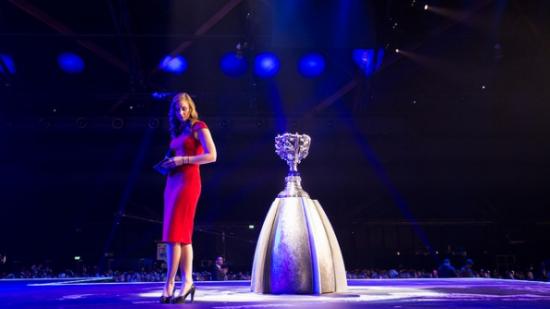In e-sports, the biggest names aren’t always the players. As might be expected of a medium becoming increasingly spectator-friendly, some of the most well-known personalities in electronic sports entertainment are those behind the in-game cameras, and in front of the real life ones.
Casters and presenters have an important role in e-sports as it begins to carve out a path between sports and performance. As a result of their considerable screen time, and the almost unfettered access fans have to their lives, these front of house faces are fast becoming the main ambition of those watching the streams. We spoke to two of League of Legends’ most familiar faces to find out how they made their way to the big screen, and what Riot are looking for in the next generation.
Eefje ‘Sjokz’ Depoortere is Riot’s leading lady. As host of the EU LCS and on-stage interviewer at major events, her on-camera appearance makes her more recognisable than casters who spend much of the match obscured by the ongoing gameplay. Having been with the team for four seasons now, Sjokz has an air of confidence about her, and the sort of effortless interview manner that makes it easy to slip into conversation. Whether that conversation happens to be in a concrete packing shed behind Wembley arena or on stage in front of countless thousands watching in the crowd and at home. But this wasn’t always the plan for Depoortere, who had more traditional aims.
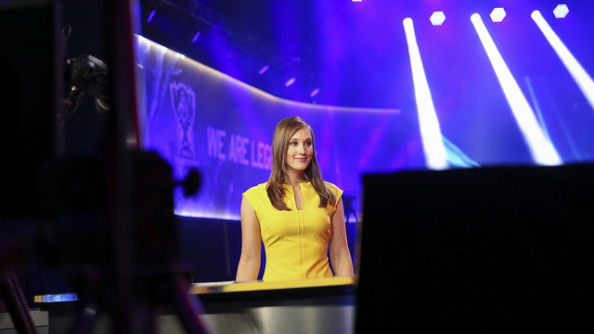
“I originally wanted to be a sports writer,” Sjokz tells us. “I always loved football, cycling, tennis, all that, and I actually went to journalism school after doing my Masters in History and really wanted to do that. But I somehow got sidetracked after college and I had, what I think a lot of people have when they leave university which is that they don’t know what to do.”
The recession in Europe makes this a common story, young professionals with high qualifications languishing as opportunities are few and far between. So she fell back on an old hobby of games, having previously been on Belgium’s Eurocup-winning Unreal Tournament team, and found League of Legends, which as any recent graduate might know is an excellent time sink. Having played for a long time, she accidentally tuned into an IEM broadcast in which CLG were playing and realised that this scene had literally everything she was passionate about doing within one industry, and applied to be a reporter for SK Gaming.
“I was terrified of growing up, I was terrified of the life after college,” Sjokz admits. “If you think about it, it’s pretty ideal, your parents pay for a lot, you have a side job, you have to study really hard but actually only at certain times of the year, so you have good amounts of freedom. And I was just really afraid of doing something that I didn’t enjoy doing and the only things I really liked were playing video games and watching sports, so I felt really lucky.”
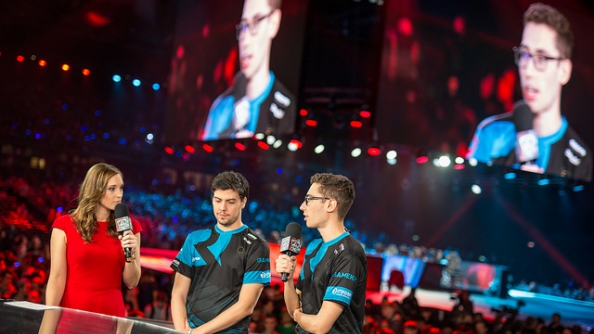
After that, it was a case of getting the work done, and getting noticed. The latter came as Sjokz was part of The Summoner’s Recap YouTube show and was eventually invited to join Travis Gafford on a new community talk show ‘Whose League is it anyway?’ in 2012. Now she is at the forefront of the EU’s LCS coverage, leading the analyst’s desk – sort of a multiway interview, a journalist’s bread and butter – and more recently, taking on the “retirement interview” of former TSM top-laner Dyrus, something of a career highlight for Sjokz.
“My growth over the last three years, I’ve been really happy with the way things have been going,” she says. “I don’t think that when I was 16, obviously I didn’t see myself as hosting this huge esports game, I wouldn’t have dreamt of that, but I always wanted to be involved in journalism and sports and well, that’s e-sports.”
For a lot of e-sports fanatics, the route into the game seems pretty closed off if they lack the prerequisite reflex times to become a pro, or seeming good fortune to wind up with a shot at hosting or casting games. But from someone on the inside, good fortune sounds a lot like hard graft.
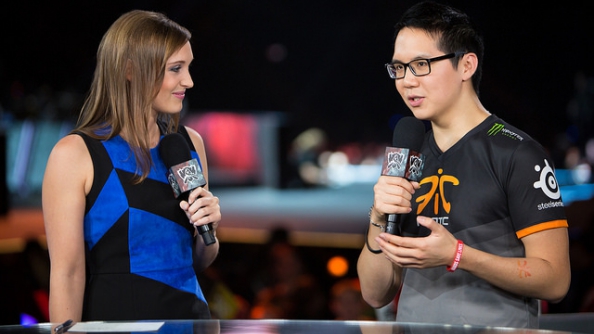
“It was 2012, the scene was very different,” Trevor ‘Quickshot’ Henry tells us. “The weekly broadcast of LCS was not around and even then competitions were still primarily based in exhibitions and big LANs, so big marquee events a couple of times a year. So I got involved by looking at places where there were not big events and saying ‘this is where I can create some content’ and maybe try to fill in some gaps.”
Quickshot is one of the primary play-by-play casters working for Riot today, commentating on LCS games in Europe. Again, a previous background on the player side of e-sports helped him, reaching LAN status with a Call of Duty 4 team from his native South Africa before moving into League of Legends.
After playing for some time, he decided to get serious about wanting to cast games by treating it as a job. “When you’re applying for a gig, if you don’t have artwork to fall back on to show people, you’re not going to get that job,” he told us. “So long story short is actually shoutcast if you want to be a shoutcaster.”
For him, in 2012, this was as easy as finding the games that weren’t being casted by Riot’s then-limited staff. Go4 weekly cups were the order of the day, and he would set regularly scheduled days he would cast, as well as creating ‘hooks’ for people to increase the attach rate of his shows. For Quickshot, an avid Star Wars fan who enthused at length about his time spent at this summer’s Secret Cinema event in London, this consisted of wearing Star Wars clothes ‘as a sort of uniform’ and, of course, his trademark South African accent.
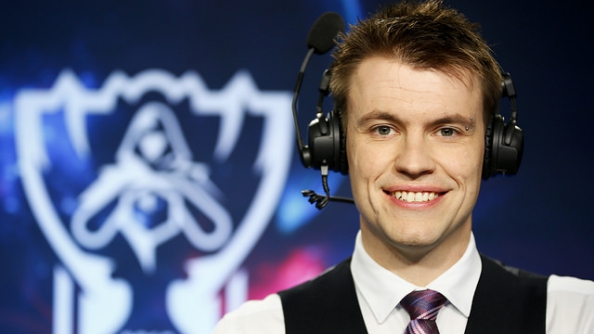
“During the course of my broadcasts, from my bedroom I might add, I got together these rudimentary graphics packages for overlays with spots for sponsor logos that I left empty on purpose,” he says. “And then I started building up this portfolio, where my 50 viewers turned into 100 turned to 200 to 500, and when I got to 1000 I started reaching out to sponsors.”
Emulating the production packages of many studios dedicated to LoL casting these days is difficult for any one person. Even back in 2012, Quickshot had the help of a community member, M4nky, who put together his graphics to allow him to focus on the game itself. But aiming to compete with the production power of Riot Games isn’t the way to get started.
“There’s five people in front of the camera, but 50 people behind it. From graphics, to stats, script, tech directors, camera guys, audio guys,” he says. “The key things for people to get right are a clear, planned and prepared broadcast, with the show opening, showing content and then closing, even if it’s rough around the edges.”
Once that’s down, the focus is developing your own style, finding out whether you are a play-by-play or ‘colour’ caster, someone to focus more on the bigger picture of the game and offer professional insight. Quickshot advises bringing along a friend to fill the other role, so you don’t have to go it alone. But when he’s not firing words rapidly into a headset during a teamfight, there are many aspects of shoutcasting that he hadn’t considered before reaching a professional level.
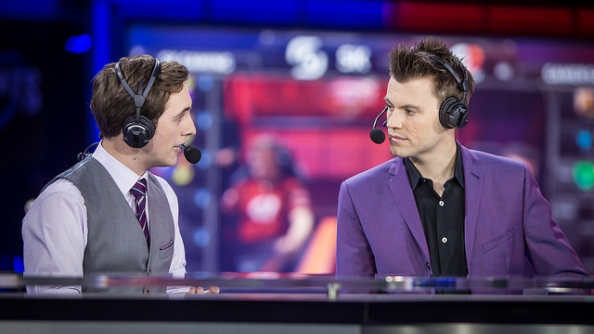
“One of the biggest things to adjust to was actually protecting my voice, something I didn’t even think about until working at the company for a year,” he says. “Vocal coaching, breathing exercises, annunciation classes, improv lessons to work with my co-casters. All these things that seem quite intangible in many ways but make perfect sense when you think about them. At the end of the day we are there to entertain as much as we are to inform.”
This balance is a high hurdle for many. Quickshot freely admits that he doesn’t have a great head for stats, but in a team the size of Riot’s there are plenty of statisticians in the back lines to feed someone the right numbers. “They tell us how many footsteps champions have made, what’s the effective damage per gold earned, percentage gold share, things like that. And that’s something that you come to grips with over time but it’s something that I’d not even considered because I simply don’t have a stats background.”
Instead, Quickshot chose to focus on what he did best, casting obscure games that people were interested in, and that eventually got him noticed. But that was in 2012. “For guys today, it’s a little more difficult just because that content is so much more difficult to find,” he admits. “If I were looking to get a gig right now in 2015, I would look at the Challenger Series games that are /not/ broadcast. One of the best of twos in the summer split is broadcast on-air and one is not, and that content is available on the website, with no casters and directed camera. So it’s not the best but it’s players that a lot of people are watching.”
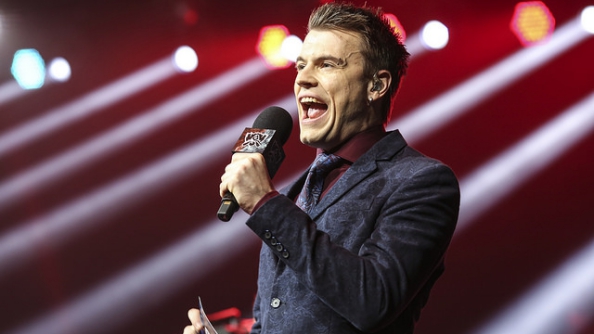
If someone were to work their way to casting those games, making sure that they had a solid enough broadcast to let their talent shine…it’s still not a direct guarantee that Riot will find them. “In terms of finding talent, that’s something that we do have a little bit of a weakness at the moment,” Quickshot says. “But in terms of fostering talent I’m very confident in saying that behind the scenes we have a great system in place.”
The recent Worlds quarter finals at Wembley in London were a first for many Brits. For many fans this was the first chance to see these world-class teams on home soil. For the BBC, a first foray into some exciting possibilities of bringing e-sports coverage to British television. And for one caster, that BBC broadcast was their first step in the next stage of their career.
James ‘Stress’ O’Leary had previously done freelance casting and hired as an observer for Riot’s EU LCS games, before being offered the chance to cast Challenger Series in the region. After proving himself in that arena, just as new teams like Origen had done, Riot began taking steps to move him up to the LCS.
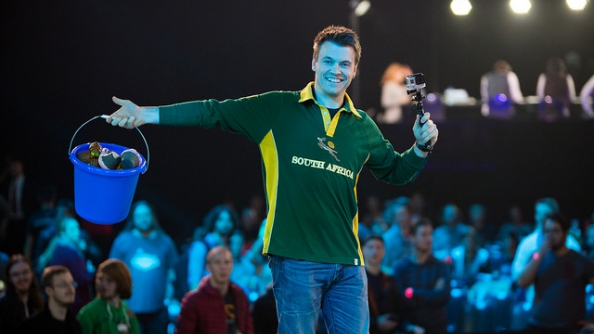
“We tailored some special segments in front of our weatherman screen to really break down a champion, really break down a play, and have that pre-planned and scripted with Stress then present him in that feature,” Quickshot says. “Then after a few of those, we then bring him on to talk about Challenger teams, because that’s his field, he’s a Challenger guy and he’s an expert on those teams. And then once we’d built up a regular face, regular voice on content that he is trusted on, we moved him up to LCS teams.”
Only a few months after his first LCS stream, Stress was on camera for the BBC’s coverage, and appears to have been well received by the community. The casting opportunities may look small for someone starting out, but by building a portfolio over time, and looking out for those exploitable windows that Riot’s all-seeing eye hasn’t yet reached, there is hope.
“It’s difficult to discover a diamond in the rough when the rough itself is already small and hard to find,” Quickshot says. “But we do have a number of guys applying each year and when it comes to finding that one voice that can work, behind the scenes we have an entire production team thinking about how we make sure to present them correctly, how we bring a new voice to League.”
